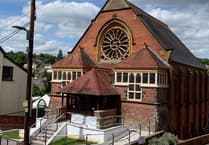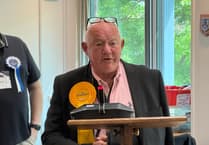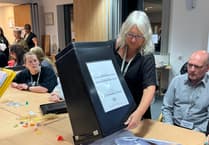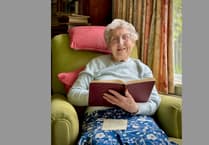REMEMBRANCE Sunday is likely to feel even more poignant this year than usual for a Crediton woman.
As Clerk of Exeter Quakers, Laura Conyngham will be in Northernhay Gardens, Exeter, laying a wreath of white poppies on behalf of all victims of war.
Laura explained that the recent statement signed by international Quaker representatives clarifies the Quaker position and suggested ways forward.
The statement on the Peace Testimony and Ukraine reads:
“Quakers are a people who follow after peace, love and unity. Our peace testimony is our witness to the Truth as we experience it.
“Our testimony manifests as a cumulative set of actions, continually tested and added to over centuries. These actions are diverse in form, but have been broadly united by: 1) Refusal to kill, 2) Relief of suffering, 3) Building the institutions of peace, and 4) Supporting peacebuilding and removing the causes of war.
“At the onset of the full scale invasion of Ukraine by Russia, the Friends World Committee for Consultation issued a Christian Call for Peace, affirming that invasion and occupation are the opposite of Christ’s universal call to reconciliation and unity, and echoing church statements in many countries, including Ukraine, calling for an immediate ceasefire replaced by a peacemaking dialogue.
“This call would echo the Golden Rule which is a foundational value of all major world religions, has the potential to eliminate violence and helps us to recognise one another.
“Almost by definition peacemaking often involves engaging with people making war, and understanding the reasons they do so.
“Nevertheless our vocation as a peace church is to seek and make real the peaceful alternatives to armed conflict which with God’s help are possible, and to ensure that the long lasting human costs of war are not forgotten or neglected.
“We continue to uphold the right to refuse to kill. We stand with conscientious objectors on all sides of this conflict, with the people in Russia who stand up against their leaders’ belligerent actions, and the people in Ukraine employing creative forms of nonviolent civil resistance.
“We continue to help relieve suffering, and hold that all nations must radically improve their approach to welcoming refugees, to fully honour the United Nations’ Refugee Convention and ensure that all displaced people - no matter their origin - have access to civil, political, economic, social and cultural rights. We will continue to press for this.
“We continue to seek to build the institutions of peace. Justice with peace requires binding frameworks of international law and restorative justice, as well as global investment in violence prevention at the community level. We know that all of these have been insufficient to prevent the injustice in Ukraine, and must be strengthened to win peace.
“And we continue to support peacebuilding measures. We call on the governments of Ukraine, Russia, neighbouring countries, the United States, NATO and the European Union, to explore all avenues - whether public or private - for a renewed conversation to address the human security needs of all the peoples and countries in the region, to help provide the basis for long-term peace.
“Whichever way this war ends, we are realistic that healing and sustainable peacemaking will in all likelihood take more than a generation, and will only be possible through inclusive and sustainable processes from the international to the local. That process must begin now.
“We are ready to play our part.”
IN THE USSR
Laura explained: “As ‘Courier’ readers may remember, I spent three-and-a-half weeks crossing USSR in 1976.
“After moving to Crediton in January 1989 with little else to do except paint the walls and look after the children, I wrote to Gorbechev, Thatcher and Pravda and received hundreds of letters from ordinary Russians in reply.
“With help from Mothers for Peace and the Russian Department at the University I matched them to British people willing to take on a penfriend.
“Some are still in touch.
“This led to me being part of a Mothers’ for Peace delegation to Kurgan, Siberia in 1992 and return visits from Tanya, from Kurgan, a few years later.
“In 2017, Raisa and her daughter Tanya, from Irkutsk, visited and stayed with us in Crediton and in accommodation in London.
“Raisa was a week younger than me. She had been teaching English all her life but this was her first visit.
“She died of cancer during the Pandemic. I am so glad she had her dream.”





Comments
This article has no comments yet. Be the first to leave a comment.